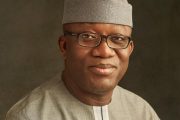Nigerian Activists Lose, Mourn Comrade Hassana Garba

The late BF

The late Yusuf Bala Usman

The late Prof Festus Iyayi

The late MD Yusuf

The struggle in the late Hassana’s 2015 poster
It is mourning time again in the community of activists in Nigeria following the sudden death of Hassana Garba, the pillar of radical student politics at the Ahmadu Bello University in the early 1990s. She died yesterday morning in Minna, Niger State shortly after complaining of headache. Until her death, she was a foremost gender voice across Nigeria. Married with two children, Amina served as an adviser to Babangida Aliyu, the immediate past governor of Niger State. She subsequently contested for the House of Representatives under the PDP but lost.
According to Steve Aluko aka Maradona who has maintained most regular touch with her, she has just written a book on Women Struggle in Nigeria and planned to upscale her charity work in the local communities. At a point in student union politics at ABU, Zaria when nearly all the ‘first’ layer of the leadership were either expelled, rusticated or in detention, Hassana almost single handedly held forte, carried the banner of hope and made it possible for the basically decapitated union to still win elections. She was, therefore, thoroughly groomed for leadership in a progressive manner and was an asset to the radical but marginalised wing of the PDP. The late Hassana was the Treasurer of the National Association of Nigerian Students, (NANS) under the Abdul Mahmud tenure in 1989. Her death brings to 13, the number of such loss to death in the community in the past few decades.
The list stretches from Comrade Anselm Akele who died in 1996 and whose only daughter is happily doing well academically; Fela Anikulapo Kuti who fits categorically into this list for anyone who reads Iyorchia Ayu’s 1985 monograph, “Creativity and Protest in Popular Culture: The Political Music of Fela Anikulapo Kuti”. This is in addition to two other works namely, Dr. Shola Olorunyomi’s Afrobeat: Fela and the Imagined Continent and Carlos Moore’s Fela: This Bitch of a Life. Fela died in 1997. Joseph Audu Mamman who died in 2001 as the Executive Director of the Community Action for Popular Participation, (CAPP); Chris Abashi, the inaugural president of NANS who died in 2004 and whose house in Akwanga was recently and totally gutted; Comrade Abdulrahaman Black, former president of Ahmadu Bello University Student Union Government who died in 2004 too; Dr. Yusuf Bala Usman, the Ahmadu Bello University, Zaria Historian and author of For the Liberation of Nigeria and The Manipulation of Religion in Nigeria, among others, who died in 2005. He died the same year with Chima Ubani, a key player in the struggle for democracy from military rule.
Dr. Jubril Bala, the Mass Communication scholar at the University of Maiduguri who brought a certain radical verve to the discipline but only to die in a road accident too soon in 2006. That was also the year Dr Beko Ransome Kuti died, a veteran of many campaigns against military rule. The list goes on to Dominic Ogankpa who died in 2007 from the Civil Liberties Organisation, (CLO); Dr Tajudeen Abdulraheem, the Pan-Africanist extraordinaire who died in a car crash in Kenya on May 25th, 2009; Gani Fawehinmi, the veteran of judicial instrumentalism followed later that year. In 2012, Olaitan Oyerinde was assassinated in Benin where he was Private Secretary to then Governor Adams Oshiomhole. Before Oyerinde was cut down, Reuben Ziri, the Historian as a prodigy went ahead. He had been in the Community Action for Popular Participation, (CAPP) as a researcher before moving to academia at the Niger State owned Ibrahim Babangida University at Lapai.
Professor Festus Iyayi was killed in a road accident in 2013. A former president of the Academic Staff Union of Universities (ASUU) and the author of the lecture “Assassins of Nation Building, 2011 Elections and Electoral Reforms in Nigeria: Chronicle of a Death Foretold.”, arguably his most thematically coherent and ideologically assertive outing on the system is also the author of several critical literary works. Earlier that year, Biodun Kolawole, the Secretary-General of NANS from 1990-1992 was similarly killed in a car accident along with his wife. He was the Head of Ola Oni Foundation at Oshogbo when he died. 2014 brought in the sudden death of Bamidele Aturu aka BF, a discourse leader and human rights lawyer who had played leadership roles in the student movement over the years. Comrade Emma Ezeazu was to follow exactly a year later after protracted illness. He had been president of NANS in the mid 1980s with great sacrifices and commitment. Ezeazu was an upscale institution builder and innovative agenda setter to his last moment.
The date of death of four activists could not be confirmed immediately before uploading hour. These were those of Dr Mohammed Alkali, the University of Maiduguri Political Scientist and ASUU activist; Thomson, Christie and Dani Adanbara. Thomson Adanbara was an unrealised genius, destroyed substantially by the Nigerian environment.
Four names bring this listing to a close, not so much about when they died but the statement their life make as far as the principle of progressive humanity is concerned. These are MD Yusuf, the Katsina prince and former IG of Police who remained a NEPU activist throughout his life; Chief Alao Aka-Bashorun who remained an Nkrumaist till death took him away; Dr Mahmud Modibbo Tukur, Ahmadu Bello University, Zaria Historian and former ASUU National President whose essay “Example of a Just Solution of the National Question: The Union of Soviet Socialist Republics” we might all need to read again, taking into consideration empirical developments since the end of the Cold War and Magaji Dambatta, the man with the most comprehensive repertoire of the original NEPU intervention in Nigerian politics, particularly of its leader, Mallam Aminu Kano. Here is a sampler. According to the now late elder statesman, more than eight persons were involved in conceiving the idea of forming NEPU but many could not turn-up because of the heavy rainfall that fell that day. Behind it but absent that day was “a young man full of wisdom and wonderful ideas about service to his people, who wanted to bring change to society, someone who could confront lion with bare hands; who was a truthful, articulate communicator with the facility of translating and communicating complicated issues to the ordinary people”.
That is his reference to Malam Aminu Kano whom he said was in the civil service and couldn’t join them on August 8th, 1950 but did so two months later “when he resigned into uncertainty of where to live, where to find daily bread having accumulated no wealth elsewhere, with no pension because he did not wait to qualify, no godfather and no business but only faith in his Maker and the cause of the people”. He described Aminu Kano as their motivator, their leader, their eyes and ears and their shield.
So, when Hassana Garba is buried by 11 O’clock tomorrow, (December 30th, 2016) at David Mark Cemetery in Minna, she will be going down on a line of a long and honourable heritage. May her spirit join all others who went there before her to torment all those tormenting Nigeria.
Comrades John Odah, Steve Aluko (Maradona) and Auwal Musa (Rafsanjani) contributed to this reporting by Adagbo Onoja




























